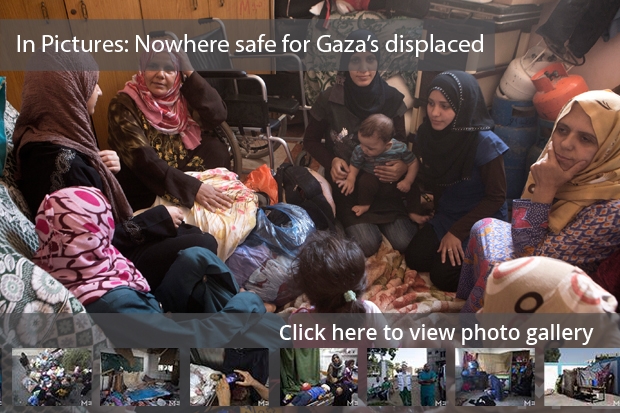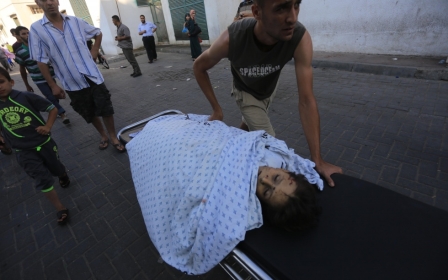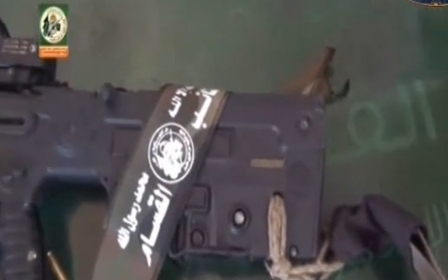Nowhere safe for Gaza’s displaced
GAZA STRIP - There is no roof over their heads, not even a tin one. No walls that - despite their vulnerability to tank shells - would at least muffle the echoes of explosions. Yet there are hundreds of people sleeping in this park next to a boulevard that runs along Omar el-Mukhtar Street, in the centre of the Gaza Strip.
“The women sleep in the houses of relatives, in UNRWA schools or at Shifa [Gaza’s main hospital]. But us, the young men and boys, we sleep here on cardboard, under the trees. There simply are no more places in the schools”, 22-year-old Ziad Hassanan told the Middle East Eye.
Hassanan’s family is one of many who fled the devastation in Shejaiya, where more than 90 died in an massive Israeli assault on 20 July. They didn’t dare return during a 12-hour ceasefire a week later: “We prefer not to know what it is like there”, the young man said.
In the morning hours, the park is full of men, but later women slowly emerge from overcrowded shelters. Donia Shaladan and her sister-in-law, Asma'a, are among them. They bring bread and cheese from a mosque charity to the children and young men waiting in the park, saying that some women came earlier, at dawn, to calm the children there.
“They cannot sleep, so we hug them, we play with them, talk, just to ease their fear. When you sleep outside, the sound of explosions is so much louder,” said Donia.
Waves of phone calls and flyers from the Israeli army instructing people in the north of Gaza Strip to flee in recent days - and later a wave of heavy tank shelling – have seen thousands more displaced. But no-one has anywhere to go.
Desperate for a shelter, hundreds of Palestinians broke into government schools in the northern area of Jabalia on Monday night.
Muhammed Abu Watfa from an Islamic charity explained to the MEE that people broke in because the others shelters were full. “In the morning, people did a head count, realised there is way too many of them for one school. So half of them came here, to nearby Faluja school and also forced the lock on the gate”, he said.
His organization came to the schools in the morning, to manage the situation and coordinate with UNRWA.
“The agency instructed the Israeli army that there are refugees here; we also asked them to put their flag on the top of the school, for protection, but they refused”, he said.
Abu Watfa was not sure if UNRWA will provide any further assistance. So far they brought blankets and cleaning supplies, but just enough for a quarter of the over 3,000 people that were staying in school by early Tuesday evening.
Before the UNRWA and the Islamic charity reached the place, a group of Palestinian scout volunteers had been there to receive people and help them find their way around. They work in teams of 10-15 people, sometimes around the clock, coordinating distribution and helping in whatever possible way.
“We haven't eaten since Monday night”, men who came to the manager's office complained. The management does not know if they will get any help from UNRWA, if there will be food, water or mattresses delivered. „If they bring food, we will eat, if not – we will wait till tomorrow. If they bring mattresses, we will have something to sleep on, otherwise we sleep on the floor”, said Awad at-Tur, who came to the school with his five children and a wife. Their youngest one, just a year old has been sick since the beginning of the war.
“The medicine does not help. He throws up, he has fever, he cries,” the worried mother said, holding the baby boy.
One of the volunteers managing the school picks up a megaphone and asks parents to keep their children closer to the walls of the classrooms surrounding the school yard, but that seems an impossible task, with hundreds of kids that had been locked for days inside overcrowded apartments, now having a bit of space to run around. Minutes after the annoucment, Israeli army started bombing the area. As shrapnel fell on the yard, the school shook and Awad's baby son starts crying again.
The concern from when the school was first flooded with refugees was that a similar tragedy to what happened in Beit Hanoun school might re-occur. There, 18 people, including a baby, were killed and over 200 were injured in suspected Israeli air strikes (is it still suspected? Also, I thought it was tank shelling) on a school yard.
Soon those worst fears would become a reality, but in another UNRWA-operated school in Jabalia, Abu Hussein. That school was hit by Israeli strikes just before 5 am, leaving 19 dead and dozens injured. The attack was condemned by the UN on Wednesday.
Christopher Gunness from the United Nations Relief and Works Agency told the BBC that the location of the school had been passed to the Israeli forces 17 times to ensure its protection. Gaza health officials say more than 40 people were killed in Jabaliya on Wednesday.
“First we heard explosions all around the school, than tank shells started to fall on us: the gate, the bathrooms, the classroom with women and children sleeping inside. In front of the door, man and older kids slept. They were killed too”, said Muhammed Abu Telah, who lives with his family in the a classroom next to one that was hit.
Asked if they will leave afterwards, a group of men shrugged, “where are we supposed to go?” Some left, as although they had nowhere to go, they were unwilling to remain in the midst of a massacre.
Ziad al-Farra, the UNRWA manager of the school, told the Middle East Eye that there were 3,200 people taking shelter there, but many left this morning in fear. He added that among those killed was the school guard.
The paramedics that came to evacuate the injured and killed from Abu Hassan school are themselves displaced. Nearby the school, at the construction site for a new hospital Yamen al-Saeed, paramedics whose original station in the north became inaccessible, set up a temporary one.
They live there now. Last night their two colleagues were injured and a rescuer from the Palestinian civil defense service was killed, when two ambulances racing together to a bombsite were targeted.
“We will stay here, and do whatever we can. We cannot sit and watch as people get killed” - one of the displaced paramedics, Ramzy Muhammed Jabar told the Middle East Eye.
He is committed to helping people, despite not receiving his salary since three months, except a 1,000 shekels emergency substitute last week. He says it's difficult, because his son has cancer, leukemia and requires medical help. Also, Ramzy's house, like 2,330 others, was completely destroyed.
In Kamal Adwan hospital morgue, a baby girl named Halima Suleyman lies wrapped in a white shroud, revealing just her peaceful face. It looked like she was asleep. Next to Halima, her mother Nihad and older sister Baraa' lies too, but their faces were too shattered to keep on view. The pool of blood under their bodies grows by the seconds.
These were just three people out of 19 killed in the Abu Hussein school, adding to the death toll of the Israeli offensive that on Wednesday had reached over 1,300 dead.
New MEE newsletter: Jerusalem Dispatch
Sign up to get the latest insights and analysis on Israel-Palestine, alongside Turkey Unpacked and other MEE newsletters
Middle East Eye delivers independent and unrivalled coverage and analysis of the Middle East, North Africa and beyond. To learn more about republishing this content and the associated fees, please fill out this form. More about MEE can be found here.




